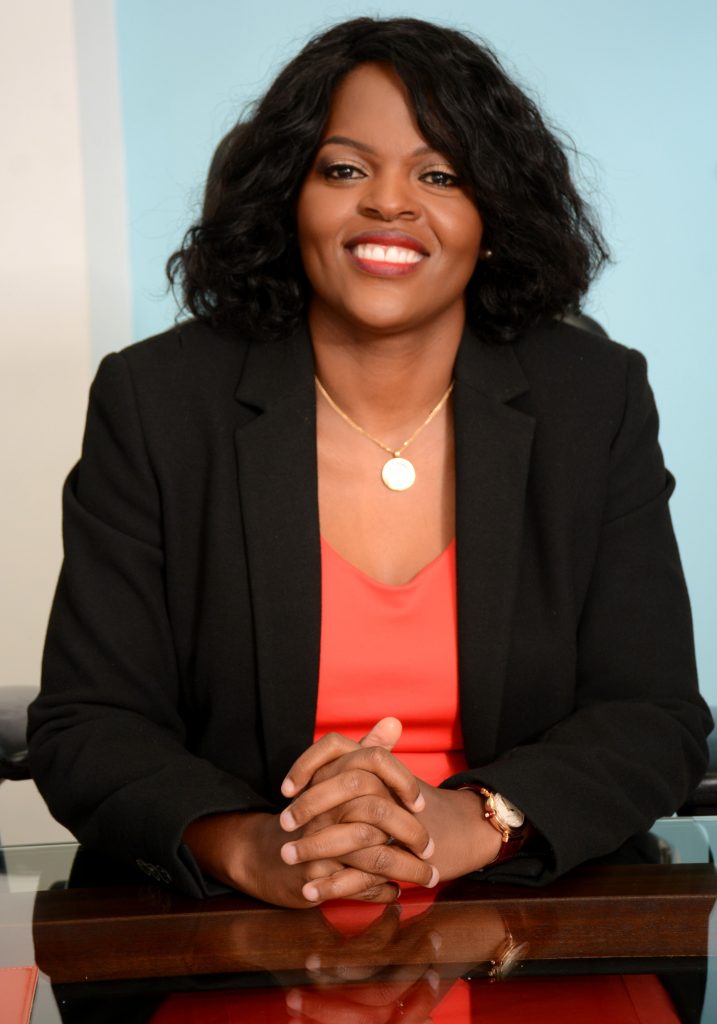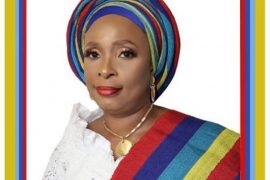Success is undoubtedly one of the major things in the world that everyone desires. Just like the men, women desire success in career, business, and even in their homes. However, there is always the question as to what one can do to be a success story. Amongst other things, team effort has been listed as one of the keys to success.
In an exclusive interview with Amazons Watch Magazine, Mrs Yolanda Cuba, CEO, Vodafone Ghana, narrates her account on her journey to the top amidst various challenges. Excerpt:
You are known today as the CEO of Vodafone Ghana, and one of South Africa’s sought-after and respected business leaders, but it has been a long time coming, and it will be fascinating and inspiring to hear your story. First of all, kindly tell us about your background and experiences, growing up as a girl in South Africa.
I grew up in Gugulethu in Cape Town, South Africa. It was an environment that resonated with communal living, hard work, and entrepreneurship. My family was a hardworking bunch – engaged in all sorts of businesses from butchery to spaza shops. My first encounter with a computer – and perhaps what started my whole drive – was digitizing the stock system for my Aunt’s shop.
I discovered that a whole new world was opening up before me – very colourful like the Baghdad of the Arabian Knights – and somehow I knew technology was something worth mastering. I wanted to learn as much as I can – not just the software but also the hardware aspects as well. My love for mathematics and logic led me to acquire two degrees in Statistics and Accounting at the University of Cape Town and Kwa-Zulu Natal. Subsequently, I also undertook the International Executive Programme at INSEAD and completed my Master’s degree in Commerce last year.
Recently, Susan Wojcicki, CEO of YouTube, a unit of Google, shared some of her experiences on gender discrimination and marginalization in the line of her work. She said “I’ve been left out of key industry events and social gatherings. I’ve had meetings with external leaders where they primarily addressed the more junior male colleagues. I’ve had my comments frequently interrupted and my ideas ignored until they were rephrased by men…” Please, also share with us some of your experiences, working in a male-dominated industry.
It is no secret that discrimination continues to exist when it comes to successful women in the corporate world. Consider when I was chosen to become CEO at the age of 29 at a JSE listed and high performing company; despite being looked down on for being young and inexperienced, I was also a woman. All these notwithstanding, I always kept a very forward-looking philosophy of believing in myself and working hard towards achieving the goals set before me. You have to learn to question the system. Be inquisitive. Be on the lookout for the door of opportunity. Do not be intimidated because you might be too young, too inexperienced or are a woman. When I was approached to consider being the CEO of that company, I initially hesitated, but then I realized that these were people much more experienced than me that were appointing me. They were saying, “we believe in you.” For me, therefore, it was an opportunity not to miss.
It was unheard of that a female aged 29-years will be chosen to head such a firm listed on the Johannesburg Stock Exchange. And yet what did I do when the opportunity came? I “seized the moment” and acted. Was I frightened initially? Yes! But did I give up? No way! I embraced it thoroughly and it has shaped who I am today. It might sound trivial but the truth is that people forget your age or gender when you know what you are talking about so be prepared to learn. Show humility and accept that you need people smarter than you and more experienced than you to succeed. Success in business is a team effort. I found that the discrimination was not as a result of being young; it was as a result of people being uncomfortable about what role you wanted to play. Comments like “I hope she is not going to change how we speak or relate to each other” were quite common. However, the truth I found was in their own insecurities. I worked to make people comfortable in being who they were so that they could ultimately accept who I was.
As the CEO of telecoms giant, Vodafone Ghana, you have demonstrated a passion for technological innovation, and have contributed immensely to Ghana’s digital revolution story. What are some of your accomplishments and successes in the technological transformation of Ghana and the African region, at large?
When I took over as Chief Executive of Vodafone, I was burning with a desire to build upon the innovative culture of the company. It was doing great otherwise – there was the Farmers club; an initiative that provides them with access to relevant information on improved farming practices, crop information, prices of commodities and expert advice, in their preferred language by a click of the button. Then there was Vodafone-X; which had become a revolution – connecting and empowering the youth in Ghana like never before. These were all making a huge impact in society. But I wanted more. For instance, I wondered why we didn’t have any product in the market that converged both mobile and fixed voice and data services together in one package? That thinking led to our unveiling of Vodafone One. It is today the only product in the market that has all one’s services – mobile data and voice; fixed voice and data together in one package.
For the business, our mission is to ignite Ghana’s digital revolution and in doing so, drive digital inclusion, ensuring no-one is left behind. As a finance person, I believe that financial inclusion is key to progress in any society. In Ghana, we have in the region of 30 to 40% financial inclusion through banks. Now for me, the question was how we drive inclusion through mobile money. Today, after a year and a half, we are the number 2 player in the market in terms of mobile money.
We kept going on; asking questions such as why certain portions of society were excluded from the digital revolution? We realized that if you were a hearing or speech impaired person, you were automatically excluded from enjoying the benefits of technological innovation in Ghana. There was no concerted effort to appeal to their specific needs. So we came out with what we call – SuperCare. It is a dedicated service which breaks the barrier to information access for the hearing and speech impaired. It employs a video service facility which grants them access to the customer service staff at Vodafone who communicate with them in a language they understand. We have also formed a strong partnership with the Hearing and Speech Impaired Association to enable us to provide them with tools including smartphones to aid the process. These are but a few of the innovative products and strategies we are implementing to ensure our customers have simplicity and convenience.
Again, our unique digital education platform Instant Schools – is an initiative that provides millions of people in Ghana with free access to online learning materials. This has been developed in conjunction with ‘Learning Equality’ and the Khan Academy. The platform was crafted in a unique way to put a wide range of basic to advanced learning materials online and give free access to everyone, from the city to the remote villages free of charge if you are a Vodafone user. This is also directly in line with our strategy of leading the digitalization agenda in Ghana. A month ago, we started with teaching young people how to code and it is just the beginning.
Ghana’s telecommunications sector has been witnessing rapid growth in market competition across the mobile, internet and fixed-line sectors, following the privatization of the sector in 1996. Ghana’s National Communications Authority’s report says the total number of mobile voice subscriptions stood at 35,984,280 in April 2017, with the penetration rate increasing to 127.06%. Your company increased its market value, as well, to 24.04%. What would you say is behind the steady growth of the industry?
I sincerely think we have been very committed to great execution and resilient in the face of the immense competition that continues to characterize the industry. As a company, our ethos has been to combine creativity and innovation in all our deliverables. We consider it essential to stand beside our customers, not above them and this is fundamental to how we run our business. Our quest to create a successful and admired brand has and continues to yield dividend through the quality of our people and our values of speed, trust, and simplicity. Our customers have really been the front and centre of all we do. Our focus on CARE – ensuring our customers have the best connectivity, accessibility; are rewarded and empowered –have been really key in this.
In all we do, we owe it to our customers and key stakeholders to lead the agenda and ensure that the country continues to make great strides in the area of economic growth and digital inclusion; the speed of execution, a committed and passionate team and people with a relentless passion for winning. In one word, the secret source to our relevance in the market has been our people. We see ourselves as the fuel that powers the engine of the Ghanaian life and that has given new meaning to what a telecom company should stand for. I believe all these have contributed to our growth and market share uptake.
A study by Price Waterhouse Coopers (PwC) in 2015, revealed that the telecom industry is one of the most taxed sectors in Ghana, with Mobile operators paying US$650 million in taxes each year, representing about 40% of total revenues in the sector. You have also expressed your concern, having been quoted as saying the industry is “taxed on the top line, about three or four taxes that are based on the top line. The second thing is that you then actually get taxed on your bottom line like everyone else…” How does the taxation policy, vis-à-vis other challenges affect the industry?
The reality today is that Ghana’s telecom industry is one of the most taxed in the country and that would naturally have a crippling effect on the sector. We are taxed on the top line as well as on the bottom-line and that provides quite some discomfort for us. For example, I can think of the top of my head, about four taxes on our top line alone. And then the other taxes that are demanded of every corporate citizen also then kicks in – so by the time you are done paying all these – you are literally back where you began. It does not encourage growth. Another example is the stabilization levy on our bottom line; as I speak, this particular tax has finished serving its purpose but we still get deducted for it. And all the while, we are expected to contribute to the economic development of the country through our community engagements and financial empowerment platforms. I sincerely think the Government must take a second look at this and help us. When we thrive, the country thrives and that’s how it must be.
Africa lags behind in terms of developing sustainable and inclusive STEM education, as revealed in the wide gender gap in STEM education, with women occupying less than 25% of STEM jobs. How do you mentor, encourage and support other young women to break gender barriers and shatter glass ceilings to achieve success?
Our girl empowerment drive has seen us introduce Vodafone Scholars – which is an initiative focused on promoting the study of Science, Technology Engineering & Maths (STEM) related courses at the Senior High and University level for girls. We bring this to life in partnership with the British Council and have so far supported 300 girls from SHS schools across the country and 30 from the University of Education. We empower them through scholarship and mentorship programmes to equip them to become responsible women in future. We continue to see great success from these young women who will go on to become Ghana’s future leaders. We specifically have a programme that recruits young women with STEM background into the business from the key Universities in the country. I am also fortunate to have 70% of my Executive team being female, which helps us to contribute to mentoring young women across the key educational institutions in Ghana. Recently, we also partnered CARE International to provide training and access to finance that allow disadvantaged women to improve their lives, run businesses and create jobs for themselves and their communities – ultimately empowering them economically and socially. This initiative, titled, “Project Revive” seeks to also prepare communities to take advantage of the Vodafone Mobile Technology services which enable individuals and groups to have access to financial services.
Project Revive has a long-term objective to transform communities, support households and improve livelihoods through women. We expect to touch about 1,250 households in Abokobi and indirectly benefit close to 10,000 people.
One of the challenges most women in pursuit of a successful career are faced with is the pivotal task of balancing family and professional life. Kindly tell us how you balance your family and work life. Has your pursuit of success in your professional life in any way affected your family life?
Balancing work and family is a really difficult thing to do, especially when you are trying to make a mark in the world. One of the things I made peace with a long time ago, was that we can all have what we want; just not at the same time. Therefore, this concept of disequilibrium, has made me realistic about my own expectations of balance. Sometimes it goes to my work – in my mind as long as neither one is winning hands down, I am ok. However, I do certain things to ensure my family life does not suffer disproportionately like integrating my children in some of my work functions, travelling with them when I go to meetings out of the country for an extended period of time, and so forth. I also rely on the rest of my family – behind every successful woman there is a platoon of strong partners.
What is the best way for the readers of Amazons Watch Magazine to connect with you?
Twitter Account: https://twitter.com/YolandaCuba
Facebook Account: https://facebook.com/YolandaCuba




